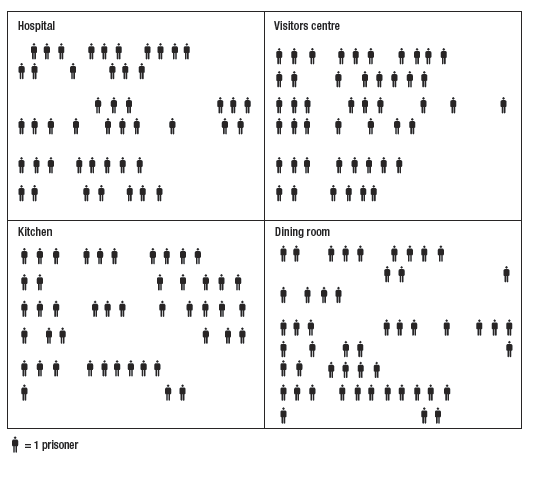
Prison Officers play a fundamental part in maintaining the safety and well-being of offenders. They are responsible for supervising inmates, keeping order and discipline and dealing with individuals who are often violent or abusive. As you might have guessed, this is an extremely difficult role. There are a number of qualities that you will need if you wish to pass the selection process.
In this blog, we’ll give you all of the information that you need on NOMS careers, and prison officer jobs.
Prison Officer Jobs: Core Competencies
The core competencies refer to the key behaviours that Prison Officers will have to demonstrate. During the NOMS careers selection process, you will be tested on these competencies on multiple occasions. Every single one of your answers should be focused around demonstrating why these competencies are important.
There are 6 core competencies for Prison Officers in total. These are:
- Communication. This will be paramount to your ability to do basic Prison Officer jobs. This includes verbal and non-verbal communication. You must be able to communicate in order to achieve an understanding of difficult situations.
- Persuading and influencing. This means that you need to be able to persuade and influence others, using reason and co-operation to reach agreements.
- Resilience. Prison Officer jobs are extremely difficult. At times your patience will be tested to its absolute limit. This means being able to push on through, even in the most difficult of circumstances.
- Empathy. This means that you will need to have a caring and understanding attitude. This is essential if you want a long and prospero
 us NOMS career.
us NOMS career. - Teamwork. When working as a prison officer, you will be spending most of your time working as part of a team. You’ll be working with other staff at the prison, and even the prisoners themselves. Rehabilitation is a team effort, and cannot be achieved by 1 person alone.
- Respect for others. It is fundamental that you have an understanding of diversity and the specific needs of different kinds of people. If not, you are highly unlikely to pass the early stages of the selection process.
NOMS Careers Prison Officer Eligibility Criteria
Prison Officers are placed in a position of high responsibility. It is important that NOMS (National Offender Management Service) know they are employing someone with integrity. With this in mind, there is a set list of eligibility criteria that you will need to meet.
You can find out all of the information you need to know about the Prison Officer Eligibility Criteria in our comprehensive blog.

Application Form & Prison Officer Selection Test
The next step is to fill in the online application form. You can locate this via the NOMS website, or via justice.gov.uk. You’ll be asked a series of vetting questions, in order to ensure that you meet the eligibility criteria as outlined above.
Depending on the role for which you are applying, at this stage you might also be asked 1 or 2 competency based questions, or questions based around your motivation for wanting the job. This makes the initial application form extremely important, as it effectively introduces your qualities to the NOMS careers service. You need to create as positive an impression as possible. In order to do this, make sure you tailor all of your responses to the core competencies as listed in this guide.
Below is an example question that you might see in the application form, and an example response on how to answer it:
‘In 250 words or less, tell us why you have applied for the role of Prison Officer, and what personal qualities you have that make you a good fit for the role’.
‘I have always had a keen interest in the criminal justice system, and in offender management. My father was a prison officer and therefore I have witnessed the firsthand the pride that working in the NOMS careers service can bring.
I’m an organised, enthusiastic and empathetic individual, with fantastic team working abilities. I’ve completed periods in a number of sectors, all of which involved working with vulnerable individuals, and I believe that this has provided me with key experience to use in this role. I’m a firm believer in offender rehabilitation and I would love the chance to be on the NOMS careers frontline, helping inmates with this process.’
Once you have submitted your NOMS careers application form, you will be facing a short waiting period. Then, after your form has been accepted, you will be sent a link inviting you to take a short NOMS careers Online Selection Test. This test will consist of numerically based exercises. You will normally be given around 50 minutes to answer up to 50 questions.
The test will examine your basic numerical skills, mainly percentages, fractions and addition. Below we have included a sample exercise, which should give you a better idea of what you’ll see in the actual test.
Sample Question
Study the diagram and then answer the questions below:

1. How many prisoners are in the hospital and visitors centre in total?
2. How many prisoners are in the kitchen and in the dining room in total?
3. How many more prisoners are in the dining room than in the visitors centre?
4. 50% of the prisoners in the kitchen go for their lunch in the dining room. How many prisoners are now in the dining room?
5. 50% of the prisoners in the visitors centre are moved to the hospital. How many prisoners are now in the hospital?
Answers: 95, 97, 3, 74, 71.
Prison Officer Assessment Day
If you are successful in the online test, you will receive an email inviting you to attend an assessment day. This will take place at an undisclosed location, and will consist of a series of challenging exercises.
The tests that you will take at the Prison Officer Assessment Day are:
- 4 Role Play simulations.
- A shorter numerical paper.
- A language based test.
- A fitness test.
Below we’ll outline the key information that you’ll need to know on each of these exercises. The numerical paper will consist of the same type of questions as we outlined in the previous section, but will be shorter in length.
Prison Officer Role Play Exercises
During the NOMS Careers Assessment Day, you will be required to take four role play exercises. These will take 10 minutes each to complete, and will take place over a 1 and a half hour period. During the role play exercises you will be tested thoroughly on the core competencies of the role. You will be expected to use these core competencies when responding to the role play actor, and will be judged against how well you demonstrate them.
Here are five top tips for passing role play exercises:
- Make sure you maintain eye contact with the role play actor.
- Use facial expressions and body language to ensure that the actor knows you are listening to them. This is simple communicational knowledge.
- Keep an open mind and never be judgemental when dealing with the scenarios.
- Never interrupt the role play actor, and don’t force your solutions on them.
- Always challenge inappropriate behaviour or language.
Language Based Test
During the Language Based Test, you will be required to carry out a reading comprehension exercise. You’ll need to read text that has been taken from a standard Prison Service source. This could be either from the internet (Prison Service website), Prison Service Orders or manuals.
Whilst you do not need to carry out any pre-assessment preparation for this exercise, you can improve your ability in this test by:
1. Visiting and reading the Prison Service website at: www.hmprisonservice.gov.uk Read the information on the website and learn as much as possible about the role of a Prison Officer and also the Prison Service.
2. Take the time to read some of the more important Prison Service Orders relevant to the role of a Prison Officer. Below we have provided you with a sample reading comprehension exercise.
Sample Reading Comprehension Exercise
‘Prison Industries is a Headquarters Unit within the NOMS Employment, Skills and Services Group that provides an overall strategic and policy framework for prison industries. The Statement of Purpose is:
“The aim of the Prison Industries is to occupy prisoners in out of cell activity and wherever possible to help them gain skills, qualifications and work experience to improve their employment prospects upon release. The management of industries must weigh the true costs and benefits to the organisation and constantly strive for greater efficiency in providing developmental opportunities for prisoners.”
Prisons provide prisoners with the chance to learn the skills they need to get a job upon release. Employment is known to be a key factor in helping to reduce re-offending. The Government’s aim therefore is to provide more prisoners with the skills and motivation to turn away from crime, improve their employability, and become productive members of society.
Prison Industries provides a supporting role to public sector prison establishments, for the management of their industrial workshops. It facilitates and coordinates the in-house production and supply of essential clothing and goods for internal consumption, providing essential employment for prisoners and opportunities for them to gain skills, qualifications and work experience to improve their employability prospects upon release.’
Q1. The aim of the Prison Industries is to occupy prisoners in….?
Q2. Prison Industries facilitates and coordinates the in-house production and supply of essential…..for internal consumption?
Q3. Prisons provide prisoners with the chance to learn…..?
Q4. The Statement of Purpose states that the management of industries must weigh the true costs and benefits to the organisation and constantly strive for greater efficiency in providing developmental opportunities for ….?
Answers:
1. Out of cell activity and wherever possible to help them gain skills, qualifications and work experience, in order to improve their employment prospects upon release.
2. Clothing and goods.
3. The skills they need to get a job upon release
4. Prisoners
Fitness Test
The final stage of the assessment centre consists of a fitness test. Strength and fitness are extremely important qualities for prison officers, who may have to get hands on with inmates, who can sometimes be violent.
Below we’ve outlined the basic premise of the assessment centre fitness test. In our comprehensive guide, we have outlined a detailed training scheme which you can use to better your chances of success.
- Grip Strength Test
The first exercise you’ll have to take is the grip strength test. This test will measure the strength of your forearm muscles, as you squeeze a measuring device. Both of your hands/arms will need to be tested in order for you to pass. - Shuttle Run Test
The shuttle run test examines your aerobic endurance levels. During this test you will have to run over a 15 metre course, getting progressively faster each time until you reach the target level required. - Dyno Test
This test measures your upper body and upper arm strength. During the test you will need to complete a number of pulls and pushes, until you reach the set target level. - Speed Test
This test measures candidates ability to negotiate obstacles, change direction at high speed and respond quickly to objects placed in their path. - Shield Test
In this test you will be required to hold a six kilogram shield, using control and restraint techniques.
 – All Prison Officers will be required to take this test at least once annually.
– All Prison Officers will be required to take this test at least once annually.
– During the assessment centre, you will also be required to take an eyesight test.
– You will need to meet a minimum standard of no less than 6/36 on the Snellen scale.
– Finally, you must be able to demonstrate binocular field vision, with at least 120 degrees of horizontal vision.
Prison Officer Jobs Interview
Once you have completed the assessment day, the prison service will undertake a number of background checks. Upon completion of these you will be invited to an interview. You will be assessed on your motivations for wanting to become a prison officer, your understanding of the competencies required and your previous experience.
During your preparation, it is useful to split the interview into 2 stages. The first stage will be a ‘getting to know you’ phase, where the interviewers ascertain your motivations for wanting the job, and the second stage will be the ‘competency phase’, where you are tested on how well you understand the job requirements and demonstrate that you have used the core competencies in your previous positions.
Below we have listed 1 question from each of these ‘stages’, along with a sample response, to show you what kind of things you can expect.
1. Why do you want to become a prison officer?
‘I want to become a prison officer because I would like the chance to work in a team-based environment, where the aim of the service is to rehabilitate and manage offenders. My Father was a prison officer, and through him I have learnt the value of offender management. He has instilled in me a great respect for the way in which the UK prison service goes about dealing with inmates, and I would now like the opportunity to be a part of that.’
2. Can you give me an example of a time when you have worked as part of a team to solve an issue?
When I was working in my previous position as an administrator, I was required to work in teams on a daily basis. Often, I was positioned as the leader of these teams. On one occasion that I can remember, our task was to organise a company-wide event. This would involve hiring out independent entertainment workers, food suppliers, health and safety specialists and other essential staff. I was one of three sub-leaders of the team, and had around 30 people under my command.
I made contact with the paramedical department of the local hospital, and requested if they could free up several members of staff and at least two vehicles. I then liaised with both of the other team leaders to ensure that I had all of the details of exactly what they were planning. I paid particular attention to the entertainments organiser. Between us, we worked out exactly which health and safety procedures would need to be put in place to accommodate the activities being arranged.
Following this meeting, I instructed the team under my control to make contact with the local fire service, and the local police service, and request for staff members from each sector to be available on the day of the event. We successfully negotiated a time and fee.
The event was a tremendous success and there no serious injuries to report. At the end of the event, I was congratulated by my boss on my efforts in securing the participation of these crucial safety management services.
For more Prison Officer job advice, and NOMS careers interview tips, please purchase our fantastic Prison Officer Guide, or attend our 1 day training course. Alternatively, visit the website of the University of Kent, which contains a wealth of fantastic information.

 us NOMS career.
us NOMS career.